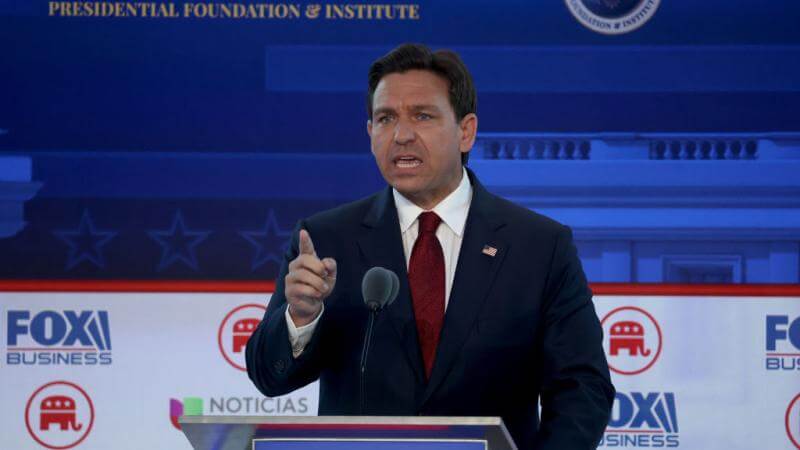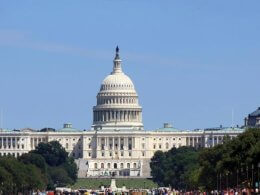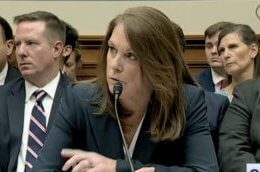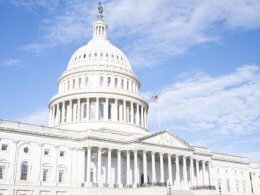The second 2024 GOP presidential primary debate Wednesday night saw seven candidates attempting to stand out in a crowded field of challengers to former President Donald Trump, though few earned raucous applause or partook in memorable exchanges.
Florida Gov. Ron DeSantis, former U.N. Ambassador Nikki Haley, tech mogul Vivek Ramaswamy, former Vice President Mike Pence, South Carolina Sen. Tim Scott, former New Jersey Gov. Chris Christie, and North Dakota Gov. Doug Burgum all made the cut to appear at the event at the Ronald Reagan Presidential Library & Museum, in Simi Valley, Calif.
Former Arkansas Gov. Asa Hutchinson was the only participant in the prior debate not to qualify for the second.
At the outset, DeSantis stood as the second place contender behind Trump, though his polling numbers have consistently fallen since announcing his campaign. Haley and Ramaswamy had entered a competition for the third-place slot while remaining candidates have struggled to gain traction.
Trump opted against participating and instead travelled to Michigan to address striking auto workers. Prior to the event, he stood as the clear front runner in the contest, leading nearest challenger DeSantis by an average 42.2% in the RealClearPolitics polling average.
While there were some heated exchanges in Wednesday evening's debate, moderators repeatedly intervened to chastise candidates for talking over one another. The debate saw candidates address a standard array of issues, including education, foreign affairs, and the economy.
Education and school choice
One of the lengthier segments saw candidates trade visions on how best to revitalize the American education system and position the next generation to thrive in the future economy.
DeSantis, Haley, and Christie touted their records on the issue while offering competing visions for improving the existing system.
Haley opened the issue, by highlighting the decline in American education and test scores in recent sures and emphasizing the importance of promoting literacy and education in modern subjects.
"We have to make sure they can read.. We need reading remediation," she said. "We need to make sure that they have school choice so that there is competition. We've got to get parents back included. We've to quit spending time on this DEI and CRT and instead focus on financial literacy, on digital literacy, and on making sure that our kids know what they need to do to have the jobs of the next generation."
She did concede that South Carolina's failure to approve universal school choice was "not out of a lack of trying."
Christie focused on his record as governor and pointed to teachers unions as a major barrier to substantive change.
"What we did was institute more charter schools and more renaissance schools, and more public school choice in New Jersey with innovative solutions," he said. "It can be done when you give people choice.
"This public school system is no longer run by the public. It is run by the teachers unions in this country," he said. "When you have the president of the United States sleeping with a member of the teachers union, there is no chance that you can take the stranglehold away from the teachers union."
DeSantis then asserted that "Florida represents the revival of American education… . We didn't just talk about universal school choice, we enacted universal school choice.
"We eliminated critical race theory and we now have American civics in the constitution in our schools.”
Cracking down on crime
DeSantis had a memorable segment while addressing the crime issue, in which asserted the need to crack down on overly lenient prosecutors. He has previously contended with multiple district attorneys who enjoyed the backing of billionaire megadonor George Soros. DeSantis vowed to tackle rising crime in major American cities by using the Department of Justice to discipline such officials.
"As president, I will use the Justice Department to bring civil rights cases against all of those left-wing Soros funded prosecutors. We're not gonna let them get away with it anymore," he vowed. "We want to reverse this country's decline. We need to choose law and order over rioting and disorder.
"We can't be successful as a country if people aren't even safe" in major cities, he went on. "When I had two progressive prosecutors that weren't following the law in Florida, I removed them from their posts and the people of Florida are safer as a result."
Burgum highlighted a shift in cultural attitudes toward law enforcement in recent years that he said had injured respect for the rule of law more broadly.
"We have to respect the people who are out there defending us every single day," he asserted.
Ramaswamy also chimed in on the matter, but pointed to crime stemming from the country's open southern boarder, in particular highlighting the crisis of fentanyl trafficking that has resulted in countless overdose deaths.
Striking auto workers
Early in the debate, candidates addressed the ongoing United Auto Workers strike, with Ramaswamy issuing a forceful condemnation of the Biden administration's economic policies, which he insisted had worsened labor conditions in the United States.
He criticized the union bosses leading the effort while expressing sympathy for the workers themselves. He did, however, insist their frustrations were misplaced and directed them to take their concerns to Washington rather than the corporate board room.
"Go picket in front of the White House," he told them. "That's really where the protest needs to be. Disastrous economic policies that have driven up prices, that have drive up interest rates and mortgage rates at the same time wages remaining stagnant. What we need is to deliver economic growth in this country."
"Hardship is not a choice, but victimhood is a choice," he contended.










